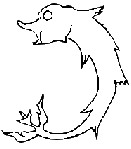Fish: Difference between revisions
| Line 204: | Line 204: | ||
* The Early Days (June 1971 - June 1975) - [http://heraldry.sca.org/precedents/early/volume1.html Collected Precedents] | * The Early Days (June 1971 - June 1975) - [http://heraldry.sca.org/precedents/early/volume1.html Collected Precedents] | ||
=In the Ordinary | =In the Ordinary= | ||
* Fish - Alewife - see [http://oanda.sca.org/ordinary/F.html#fishother Fish - Other]] | * Fish - Alewife - see [http://oanda.sca.org/ordinary/F.html#fishother Fish - Other]] | ||
* [http://oanda.sca.org/oanda_desc.cgi?p=FISH%2dANGELFISH Fish - Angelfish]] | * [http://oanda.sca.org/oanda_desc.cgi?p=FISH%2dANGELFISH Fish - Angelfish]] | ||
Revision as of 18:26, 23 January 2021
WARNING: Do not cite this page as a reference. This page is on this wikispace only to make the content "searchable" and easier to find. If you find the information you seek here, go to the original sources to verify the information and use them for your documentation.
See also Sea Creatures
Illustrations:
Period:
Rays:
| Macclesfield | Pierpoint |
| Macclesfield Psalter c1330, skate | Pierpoint Morgan MA3900 f47, early 1590s, manta ra |
Attired fish, winged fish, fish head:
| Siebmacher | Siebmacher, | 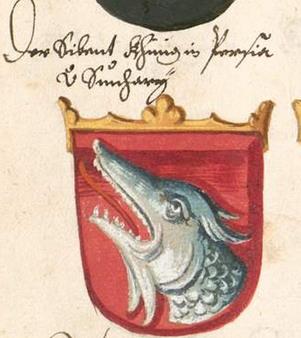
| |
| Siebmacher 1605, plate 63, Die Gutten, stag fish | Armorial de Gelre, 1370, winged fish | Siebmacher, 1605, plate 69, winged fish | BSB Csg 9210 Grunenburg Wappenbuch, 1602-04, f72r, fish head ululant ? |
Dolphin, sardines on a bend, woman windsurfing a fish:
| Grunenberg | Livro | |
| Grunenberg Wappenbuch, BSB Csg 9210, 1602-04, f68, dolphin vs. elephant-fish vs sea-elephant | Livro do Armeiro Mor, 1506-09, Portugal, f129, river of sardines | BSB Csg 9210, Grunenberg Wappenbuch, 1602-04, f03, fish surfing lady |
Fish interlaced, fish on a stringer, fish skeleton:
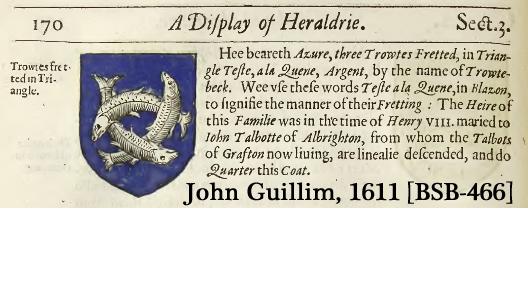
|
https://scontent-ord.xx.fbcdn.net/hphotos-xfa1/v/t1.0-9/11043015_10205847119919122_4506321123448156180_n.jpg?oh=e4e89a4f4260dee5041852ac6698fea3&oe=55DB7721 | Siebmacher |
| Fish interlaced | Siebmacher 1605, stringer of fish and fleurs, FB image courtesy of Rayne Evynwod. | Siebmacher Plate 197, fish skeleton |
Modern:
PicDic:
| http://mistholme.com/dictionary/barbel/ | http://mistholme.com/dictionary/dolphin/ | http://mistholme.com/dictionary/fish/ |
Pennsic Traceable Art Project
SENA Appendix L:
A Partial List of Postures and Orientations
This is a list of postures and orientations that can be used to determine whether two charges or groups of charges conflict or whether there is a distinct change for posture/orientation.
Animate Charges
D. Fish: The postures listed within each group generally conflict, though a distinct change may be given for facing to dexter or to sinister.
- haurient, urinant
- naiant
F. Sea creatures and other Erect-Default Creatures: This category is for sea creatures and other creatures whose default is erect. The postures listed within each group generally conflict.
- erect
A Heraldic Primer:
Sea Creatures and their postures - http://heraldry.sca.org/primer/fish.html (defunct, originally by Stephen Gold)
As we have discussed the birds of the air and the beasts of the field, the denizens of the ocean are also seen in armory. They range from the dolphin (a fish very different from Flipper) and the whale through various different fish used primarily for canting. Rounding out the aquatic cavalcade are lobsters, crabs, escallops, octopi [now to be blazoned as polypus/polypi as of March 2012 LoAR in order to use a more period term] and squid [to be blazoned as calamarie or cuttle-fish per the March 2012 LoAR].
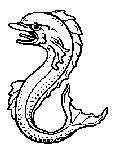
|
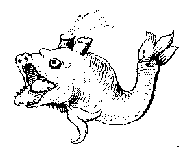
|
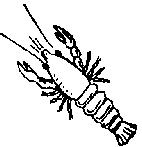
| |
| A dolphin | A lucy (medieval name for pike) | A whale | A lobster |
Just as beasts and birds have certain names for postures, most fish have specific names for postures, as outlined below.
Precedents:
Precedents of the SCA College of Arms - http://heraldry.sca.org/laurel/precedents.html
Morsulus Heralds Website - http://www.morsulus.org/ (to search the LoARs and Precedents)
Use the above links to be sure any precedents listed below haven't been superseded by newer precedents.
Definition:
December 2013 - dolphin posture:
From Wreath: Dancing Dolphins This month a ruling had us examining heraldic dolphins more closely. Precedent has long held that there is no DC for the difference in facing of a dolphin to dexter or sinister when it is haurient or urinant (in a vertical orientation). This precedent traces back to a ruling made in May 1992:
- [a dolphin urinant contourny versus a dolphin urinant] There is...nothing for reversing the fish in this position... [Isabeau Bonheur, R-Caid, May 1992 LoAR]
The Glossary of Terms states that the default posture for a heraldic dolphin is naiant (in a horizontal orientation). It says nothing about whether or not the body is straight, embowed, or embowed-counterembowed, and we do not typically grant difference for these variations. A random examination of registrations both old and recent show that the typical depiction for heraldic dolphins is embowed-counterembowed, as expected, and so we are explicitly adding that to the default posture for heraldic dolphins, regardless of their orientation on the field.
... If the dolphin is drawn in such a manner that it is difficult to tell which way it is facing, as in the May 1992 submission, it will be returned for redraw. http://heraldry.sca.org/loar/2013/12/13-12cl.html
September 2011 - manta ray default posture:
#70Tiberius Octavius Bellicianus. Per chevron inverted Or and gules, in chief a manta ray bendwise sable. ...The use of the posture tergiant is a step from period practice for most fish, but it is the default posture for flat fish such as skates and rays. http://heraldry.sca.org/loar/2011/09/11-09lar.html
egisterability (Restricted, Reserved, SFPP, OOP):
September 2011 - manta ray:
#70Tiberius Octavius Bellicianus. Per chevron inverted Or and gules, in chief a manta ray bendwise sable. Based on the presentation of evidence of period citations in Europe of manta rays, the use of a manta ray is no longer a step from period practice. The use of the posture tergiant is a step from period practice for most fish, but it is the default posture for flat fish such as skates and rays. http://heraldry.sca.org/loar/2011/09/11-09lar.html
Conflict:
March 2020 - From Wreath: Heraldic Whales and Natural Dolphins
The Letter of Pends and Discussion included a submission that raised the question between a heraldic whale and a natural dolphin, which existing precedent does not address. A heraldic whale is a monstrous beast-headed fish-like creature not unlike a heraldic dolphin. As used in the SCA, heraldic whales have distinctive though inconsistent features such as tusks and a spout, based upon various cartographic depictions. The whale is a period heraldic charge, found in period heraldic treatises such as de Bara's Blason des Armoiries (1581), though they do not include spouts or tusks. Without the distinctive features, the whale visually similar to a heraldic dolphin and thus no difference is granted between them. Additionally, we have a long tradition of not granting difference between natural and heraldic versions of the same charge. This is true of both dolphins and whales. However, it has also often been ruled that conflict is not necessarily transitive. The tusks, spout, and body proportions, if they were used consistently with no period heraldic example, would have made the charge visually distinct from a natural dolphin. However, due to both the lack of consistency in depicting heraldic whales in SCA heraldry and a period heraldic example which show none of these features, there is no compelling reason to provide a DC between a heraldic whale and a natural dolphin.
In summary:
- A heraldic whale conflicts with a natural whale
- A heraldic whale conflicts with a heraldic dolphin
- A heraldic dolphin conflicts with a natural dolphin
- A heraldic whale conflicts with a heraldic dolphin
http://heraldry.sca.org/loar/2020/03/20-03cl.html#3
December 2013 - dolphins facing:
From Wreath: Dancing Dolphins This month a ruling had us examining heraldic dolphins more closely. Precedent has long held that there is no DC for the difference in facing of a dolphin to dexter or sinister when it is haurient or urinant (in a vertical orientation). This precedent traces back to a ruling made in May 1992:
- [a dolphin urinant contourny versus a dolphin urinant] There is...nothing for reversing the fish in this position... [Isabeau Bonheur, R-Caid, May 1992 LoAR]
...
An examination of the two devices in conflict in May 1992 shows that while the registered dolphin was embowed-counterembowed, the submitted one was nearly straight. It does seem reasonable to grant no difference for the facing to dexter or sinister for a straight fish haurient or urinant. However, as a well-drawn dolphin has a distinct head, even when the degree of embowing is small, we are able to tell in which direction it is facing; therefore we are explicitly overturning precedent with regards to dolphins, and will grant difference for facing. This is analogous to our ruling in July 2013, that granted a DC between haurient or urinant as "dolphins have a distinct enough head to distinguish whether the head is to chief, as in haurient, or to base, as in urinant." If the dolphin is drawn in such a manner that it is difficult to tell which way it is facing, as in the May 1992 submission, it will be returned for redraw.
Identifiability:
Collected Precedents:
- 2nd Tenure of Elisabeth de Rossignol (April 2011 - August 2011) - Collected Armory Precedents
- 1st Tenure of Elisabeth de Rossignol (May 2005 - July 2008) - FISH and DOLPHIN and WHALE
- The 2nd Tenure of François la Flamme (October 2004 - May 2005) - FISH and DOLPHIN
- The Tenure of Shauna of Carrick Point (May 2004 - August 2004) - Collected Armory Precedents
- 1st Tenure of François la Flamme (August 2001 - April 2004) - Collected Armory Precedents
- The Tenure of Elsbeth Anne Roth (June 1999 - July 2001) - Collected Armory Precedents
- The Tenure of Jaelle of Armida (June 1996 - June 1999) - Single HTML Document
- 2nd Tenure of Da'ud ibn Auda (November 1993 - June 1996) -
- The Tenure of Bruce Draconarius of Mistholme (June 1992 - October 1993) - Collected precedents
- 1st Tenure of Da'ud ibn Auda (June 1990 - June 1992) -
- The Tenure of Alisoun MacCoul of Elphane (September 1986 - June 1990) - Collected Precedents
- The Tenure of Baldwin of Erebor (August 1984 - August 1986) - Single HTML Document
- The Tenure of Wilhelm von Schlüssel (August 1979 - August 1984) - Collected Precedents
- The Tenure of Karina of the Far West (December 1975 - June 1979) - Collected Precedents
- The Early Days (June 1971 - June 1975) - Collected Precedents
In the Ordinary
- Fish - Alewife - see Fish - Other]
- Fish - Angelfish]
- Fish - Catfish - see Fish - Other]
- Fish - Crab - see Arthropod - Lobster]
- Fish - Dolphin - 1] (includes mahi mahi)
- Fish - Dolphin - 2]
- Fish - Dolphin - 3 or more]
- Fish - Herring - see Fish - Other]
- Fish - Lobster - see Arthropod - Lobster]
- Fish - Lucy - see Fish - Other]
- Fish - Marlin - see Fish - Other]
- Fish - Mollusk - see Mollusk]
- Fish - Narwhal - see Fish - Whale]
- Fish - Octopus - see Mollusk - Octopus]
- Fish - Orca - see Fish - Whale]
- Fish - Perch - see Fish - Other]
- Fish - Pike - see Fish - Other]
- Fish - Ray]
- Fish - Roach - see Fish - Other]
- Fish - Sailfin - see Fish - Other]
- Fish - Salmon - see Fish - Other]
- Fish - Sculpin - see Fish - Other]
- Fish - Seahorse]
- Fish - Shark - see Fish - Other]
- Fish - Stingray - see Fish - Ray]
- Fish - Swordfish - see Fish - Other]
- Fish - Trout - see Fish - Other]
- Fish - Whale]
- Fish - Other]
- Fish fin - see Body part]
- Fish hook - see Hook]

